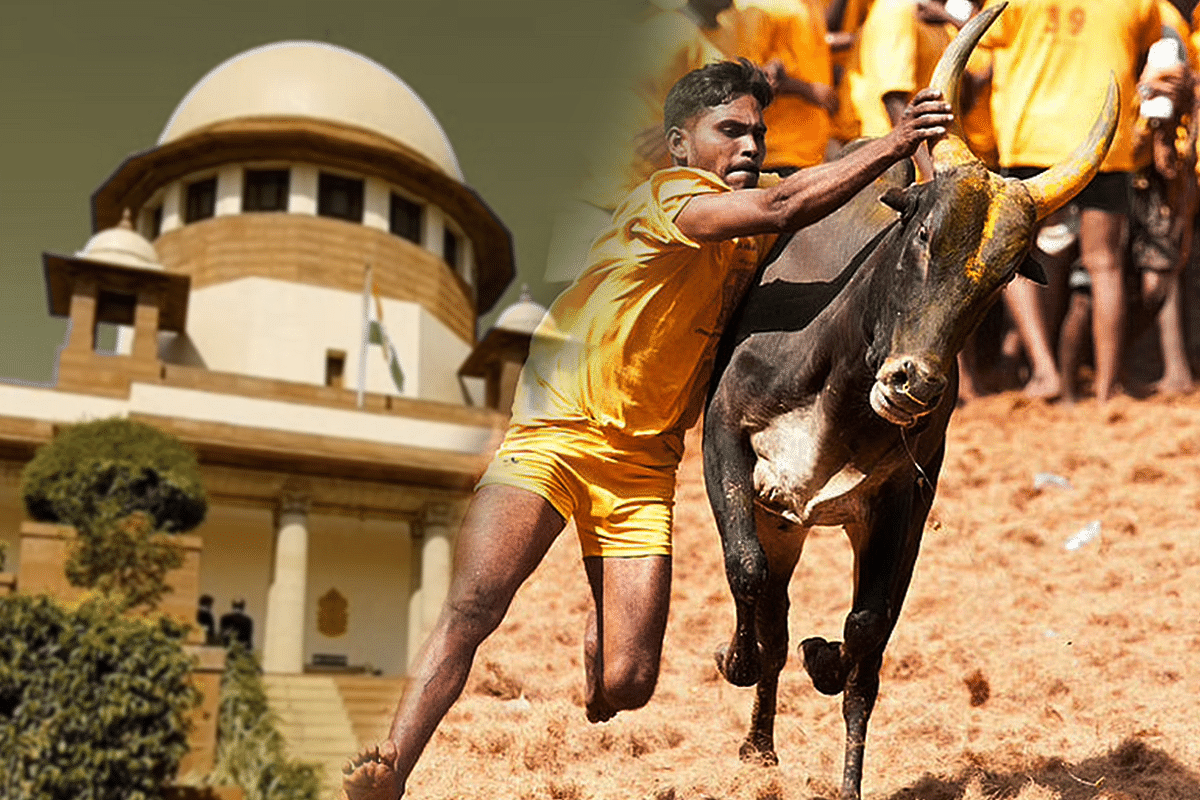Ideas
Is SC Verdict On Jallikattu A Sign Of Its Growing Cultural Sensitivity? Real Test Case Is Sabarimala
- The one gain from the Jallikattu verdict, and the change in tune on same-sex marriages, is that the highest court is not resistant to cultural arguments or logic.
- One hopes it gets out of its colonised mindset and starts looking at Indian issues with an Indic lens.

Jallikattu.
A Supreme Court constitutional bench headed by Justice K M Joseph has upheld the validity of a Tamil Nadu law that allows the bull-taming sport of Jallikattu. It also allowed two other bull-racing sports in Karnataka and Maharashtra.
Coming around nine years after the apex court first upheld a total ban on Jallikattu in 2014, this about-turn is a kind of unstated mea culpa.
The bench suggested it will not interfere with the legislature’s view that Jallikattu is part of the state’s cultural heritage.
According to Bar and Bench, the court said: “We will not disrupt the view of the legislature…since the legislature has taken the view that it is part of the cultural heritage of the state…”.
This is unusual, for the Supreme Court has, in the past, ridden rough-shod over cultural sensitivities.
It has curbed the use of crackers during Diwali, imposed restrictions on the height of the dahi handi human pyramid during Janmashtami celebrations, and ended the Sabarimala bar on women in the reproductive age since the deity, Swami Ayyappa, is worshipped as a Naisthika Brahmachari, an eternal celibate.
What one does not know is whether this is only a partial retreat on the part of a court due to the political pressures brought on by the Tamil Nadu government, or a more welcome rethink on its part about rushing to judgement on cultural practices in general, especially if they happen to be Hindu in character.
We saw evidence of the latter in April, when the constitutional bench headed by the Chief Justice, D Y Chandrachud, went over the top to suggest that there is nothing absolute about gender identity. He said this when hearing pleas to allow same-sex marriages.
The bench even considered bringing same-sex marriages within the ambit of the Special Marriage Act, a law specifically devised by Parliament to allow for inter-faith or inter-caste marriages. It, however, steered clear of messing around with personal laws.
But as the Solicitor General, Tushar Mehta, started educating the bench on the huge legal impact any decision to legalise same-sex marriages would have, the court started changing its stand.
Mehta made two points: he said that “recognition of same sex marriage will open 160 other laws for change. Is this a matter for the court to decide or a matter of legislative policy?”
He also wondered how the courts can legalise matters about the LGBTQIA+ group, with the plus sign indicating that many self-declared genders can be inconclusive or even whimsical.
Now, with the bench reserving its verdict in the case, the indications are that it will limit itself to issuing a “constitutional declaration” on the validity of same-sex marriage, without trying to amend any particular law, which is within the purview of legislatures. This will have limited impact on the ground.
One hopes that when the Supreme Court finally gets down to reviewing the Sabarimala case, it will look at the cultural rights of the devotees involved.
The only problem is that the Left Front government in Kerala may not be as supportive of Hindu culture as the DMK government was on Jallikattu.
The one gain from the Jallikattu verdict, and the change in tune on same-sex marriages, is that the highest court is not resistant to cultural arguments or logic. One hopes it gets out of its colonised mindset and starts looking at Indian issues with an Indic lens.
Support Swarajya's 50 Ground Reports Project & Sponsor A Story
Every general election Swarajya does a 50 ground reports project.
Aimed only at serious readers and those who appreciate the nuances of political undercurrents, the project provides a sense of India's electoral landscape. As you know, these reports are produced after considerable investment of travel, time and effort on the ground.
This time too we've kicked off the project in style and have covered over 30 constituencies already. If you're someone who appreciates such work and have enjoyed our coverage please consider sponsoring a ground report for just Rs 2999 to Rs 19,999 - it goes a long way in helping us produce more quality reportage.
You can also back this project by becoming a subscriber for as little as Rs 999 - so do click on this links and choose a plan that suits you and back us.
Click below to contribute.
Latest